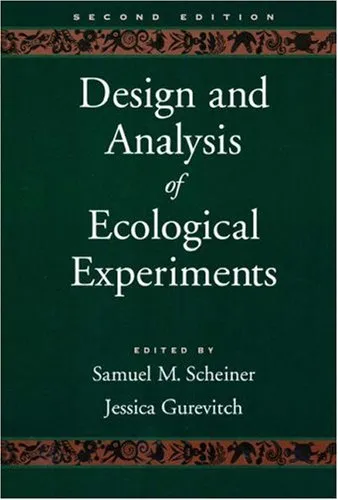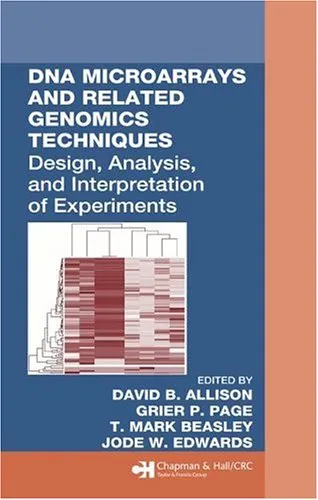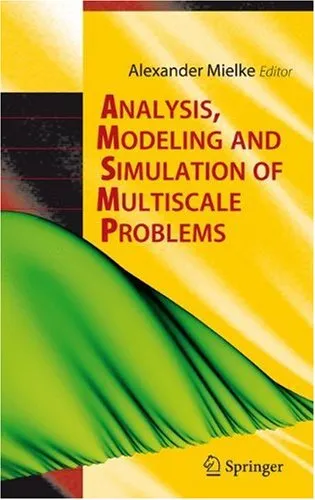Design and Analysis of Ecological Experiments
4.3
Reviews from our users

You Can Ask your questions from this book's AI after Login
Each download or ask from book AI costs 2 points. To earn more free points, please visit the Points Guide Page and complete some valuable actions.Related Refrences:
Introduction to "Design and Analysis of Ecological Experiments"
Written by Samuel M. Scheiner and Jessica Gurevitch, "Design and Analysis of Ecological Experiments" serves as a comprehensive guide for ecologists and environmental scientists who aim to strengthen their research practices. This book delves into the intricacies of planning, conducting, and analyzing ecological experiments, providing both foundational knowledge and advanced methodologies. With its focus on integrating statistical rigor with ecological theory, the book equips readers with the tools needed to effectively address complex environmental questions.
Through its clear and engaging writing, this book demystifies the often-intimidating process of experimental design and statistical analysis in ecological research. It is not merely a technical manual but a roadmap for tackling ecological problems with scientific precision and creativity. Designed to assist researchers at all stages, from students to seasoned professionals, it offers practical examples, case studies, and invaluable insights to bridge the gap between theory and practice.
Detailed Summary of the Book
"Design and Analysis of Ecological Experiments" addresses the critical challenges that ecologists face when studying natural systems, which are inherently complex, dynamic, and variable. The book begins by laying out the foundational principles of experimental design in ecology, including discussions on hypothesis formulation, sampling techniques, and replication. It emphasizes the importance of controlling for confounding factors while respecting the natural variability of ecosystems.
Each chapter builds upon the previous one, offering in-depth analysis of specific experimental approaches, such as factorial designs, randomized block designs, and gradient experiments. The authors provide step-by-step guidance on how to implement these designs in real-world scenarios and interpret the results meaningfully. Statistical tools and methods, ranging from classical analysis of variance (ANOVA) to advanced multivariate techniques, are discussed in detail, making statistical intricacies accessible for ecologists.
What sets this book apart is its focus on applying ecological theory to experimental design. It discusses how to formulate meaningful experiments that test hypotheses effectively, addressing real-world issues like biodiversity loss, habitat fragmentation, and climate change. The second section of the book is dedicated to case studies demonstrating how these principles have been successfully applied in diverse ecological contexts.
Key Takeaways
- Gain a deep understanding of the principles of sound experimental design tailored for ecological research.
- Learn how to apply advanced statistical methods to analyze ecological data effectively.
- Understand common pitfalls in ecological experiments, including pseudoreplication and misinterpretation of results, and how to avoid them.
- Explore practical applications through real-world case studies, bridging the gap between theory and practice.
- Develop the skills to construct hypotheses and experiment designs that address contemporary ecological challenges, such as pollution, invasive species, and climate change.
Famous Quotes from the Book
Throughout the book, Samuel M. Scheiner and Jessica Gurevitch offer powerful insights that resonate with researchers. Some notable quotes include:
"Ecological experiments are not merely controlled manipulations but a dialogue with nature, seeking both answers and questions."
"Good experimental design is about finding balance — between control and realism, between complexity and simplicity."
"A well-designed experiment is one that allows nature to tell its story, with as little interference from us as possible."
Why This Book Matters
"Design and Analysis of Ecological Experiments" is a cornerstone for anyone involved in ecological research. It provides an essential framework for designing experiments that are scientifically robust, repeatable, and meaningful. The insights gleaned from this book go well beyond the confines of academia, aiding in the formulation of evidence-based environmental policies and interventions.
The book's relevance has only grown in recent years as the pace of global environmental change accelerates. It offers a much-needed methodology to disentangle complex ecological interactions, helping scientists make informed predictions and decisions. By equipping ecologists with the tools to conduct controlled, meaningful experiments, this book contributes directly to our understanding of ecological processes and our ability to mitigate environmental problems.
Furthermore, its engaging writing and emphasis on applied learning make it accessible to a broad audience. Whether you are a student beginning your journey in ecological research, a professional scientist refining your skills, or a policymaker seeking to understand the science behind environmental decisions, this book offers invaluable guidance and perspective.
Free Direct Download
You Can Download this book after Login
Accessing books through legal platforms and public libraries not only supports the rights of authors and publishers but also contributes to the sustainability of reading culture. Before downloading, please take a moment to consider these options.
Find this book on other platforms:
WorldCat helps you find books in libraries worldwide.
See ratings, reviews, and discussions on Goodreads.
Find and buy rare or used books on AbeBooks.
1231
بازدید4.3
امتیاز0
نظر98%
رضایتReviews:
4.3
Based on 0 users review
Questions & Answers
Ask questions about this book or help others by answering
No questions yet. Be the first to ask!













